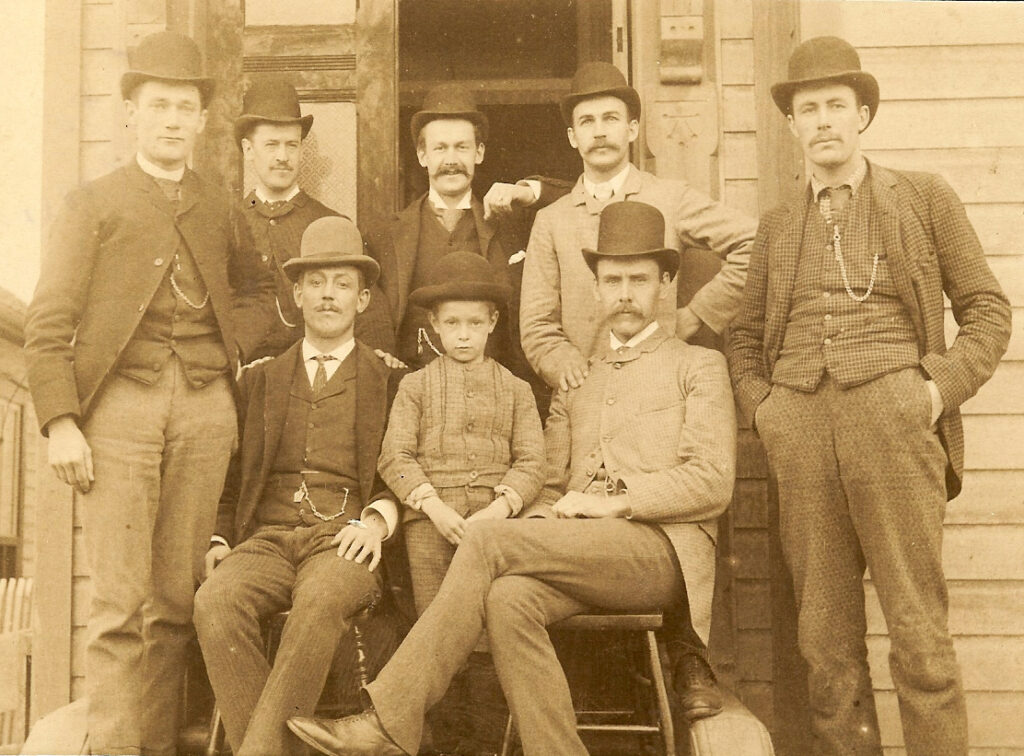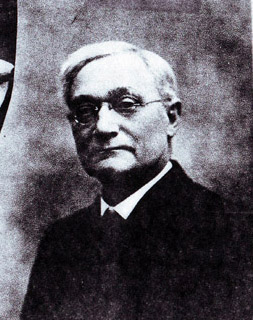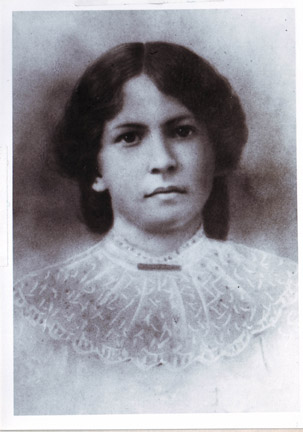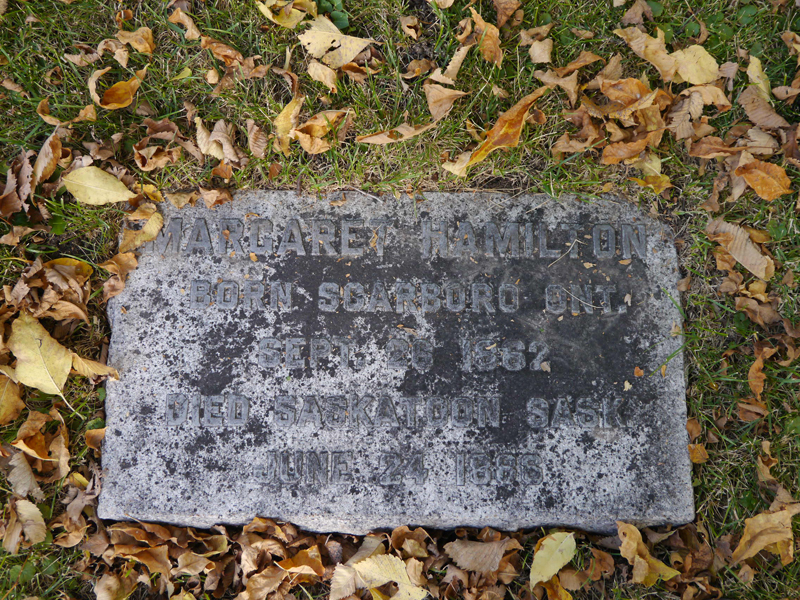As a child, my great-uncle John Stobo Hamilton admired Scottish-born missionary doctor David Livingstone. Famous for his search for the source of the Nile River, Livingstone was much more than an explorer: he wanted to bring Christianity to people in the interior of Africa, and to free them from slavery.
Livingstone so inspired John that he also wanted to become a missionary doctor. John did become both a minister and a physician, but he never got to Africa. His patients in rural North Dakota were lucky indeed.
The third child of James Hamilton and Isabella Glendenning, John was born on the family farm in Scarborough, Ontario in 1866. He was a teenager when the Hamilton family moved to newly founded Saskatoon, Saskatchewan.
John’s first job was a temporary teaching position in Saskatoon in 1887. He then taught school on Vancouver Island for two terms between 1888 and 1890.

The Hamilton family moved to Winnipeg, so John joined them there to continue his own studies. He graduated with a B.A. in philosophy from Manitoba College in 1892, then did a year of theology at Knox College in Toronto. He returned to Winnipeg to finish his theology degree, graduating from Manitoba College in 1895. Ordained as a Presbyterian minister a year later, he immigrated to the United States and became a pastor in rural North Dakota.
There he met his future wife, Alison Blanche Wilson, also known as Alice, a petite brunette with beautiful brown eyes. A school teacher, active in the church and the community, she was just what the quiet pastor needed. Before they married, however, he wanted to complete his medical degree. He began studying medicine in Winnipeg, then transferred to the University of Kentucky in Louisville, graduating in 1902.
Two of his classmates did become missionary doctors, but both soon died: one succumbed to bubonic plague after a few months in India, while the other was murdered by bandits in Tibet. It is not clear whether John still planned to become a medical missionary, but at this point, he returned to his ecclesiastical duties in the U.S. After he and Alice were married in 1903, they moved to Chinook, on the plains of central Montana.
John’s dreams of going to Africa were finally dashed when he contracted typhoid fever. After that, he never fully regained his health and he gave up his position as a minister. When the town of Hansboro, North Dakota, needed a doctor in 1906, the family moved there and John practised as a country doctor for the rest of his life.

In 1917, the family moved to the busy town of Bathgate, ND, near the Canadian border, and from there they were often able to visit John’s brothers and their families in Winnipeg, about 80 miles away.
John’s niece Olive Hamilton later described him as a quiet man who was gentle, kind and had a good sense of humour. His patients loved him, but he may have been intellectually rather lonely. He was interested in everything, but there were not many people he could discuss his interests with. “Everyone thought a very great deal of him, though,” Olive recalled in a letter to her cousin.
John and Alice had two children: Alison Isabel Hamilton (known as Isabel), born in Montana in 1905, and Donald James Hamilton, born in 1913. Tragically, Donald died of complications from diphtheria in 1915 and was buried in the Hamilton family plot in Winnipeg.
As a teenager, Isabel often accompanied her father when he made house calls so she could practice driving, and this gave them the opportunity to get to know each other well. She left for college in 1921 and became a public school teacher. By the time she married in 1933, it was too late for her father to attend the wedding. He died of a heart attack on August 22, 1932, and is buried with his young son, his mother and his siblings in Winnipeg. Isabel died in 1968 and Alice in 1971; both are buried in Litchfield, Minnesota.
See Also:
“Five Brothers,” Dec. 1, 2018, Writing Up the Ancestors, https://writinguptheancestors.blogspot.com/2018/12/five-brothers.html
“From Lesmahagow to Scarborough,” Dec. 13, 2013, Writing Up the Ancestors, https://www.writinguptheancestors.ca/2013/12/from-lesmahagow-to-scarborough.html
“The Stobos of Lanarkshire,” Dec. 28, 2016, Writing Up the Ancestors, https://www.writinguptheancestors.ca/2016/12/the-stobos-of-lanarkshire.html
Sources:
Thanks to Alison Mossler Wright, of Dallas Texas, for researching her grandfather’s life and writing about him so eloquently. This article is an abbreviated version of hers.
- “David Livingstone (1813-1873),” http://www.bbc.co.uk/history/historic_figures/livingstone_david.shtml, accessed March 21, 2019.
- John Stobo Hamilton, born April 17, 1866; Hamilton family bible, private collection.
- “North Dakota, County Marriages, 1872-1958,” database with images, FamilySearch(https://familysearch.org/ark:/61903/1:1:QGKR-XR5N : 26 September 2018), John S Hamilton and Alison B Wilson, 11 Jun 1903; citing Pembina, North Dakota, United States, State Historical Society of North Dakota, Bismarck; FHL microfilm
- 1910 census “United States Census, 1910,” database with images, FamilySearch (https://familysearch.org/ark:/61903/1:1:MLG2-X2L : accessed 21 March 2019), John S Hamilton, Sidney, Towner, North Dakota, United States; citing enumeration district (ED) ED 233, sheet 8A, family 113, NARA microfilm publication T624 (Washington D.C.: National Archives and Records Administration, 1982), roll 1148; FHL microfilm 1,375,161
- “United States Census, 1930,” database with images, FamilySearch (https://familysearch.org/ark:/61903/1:1:XKVZ-HW4 : accessed 21 March 2019), John S Hamilton, Bathgate, Pembina, North Dakota, United States; citing enumeration district (ED) ED 3, sheet 1A, line 33, family 6, NARA microfilm publication T626 (Washington D.C.: National Archives and Records Administration, 2002), roll 1740; FHL microfilm 2,341,474.
- John Stobo Hamilton, died Aug. 22, 1932; gravestone, Elmwood Cemetery, Winnipeg.


